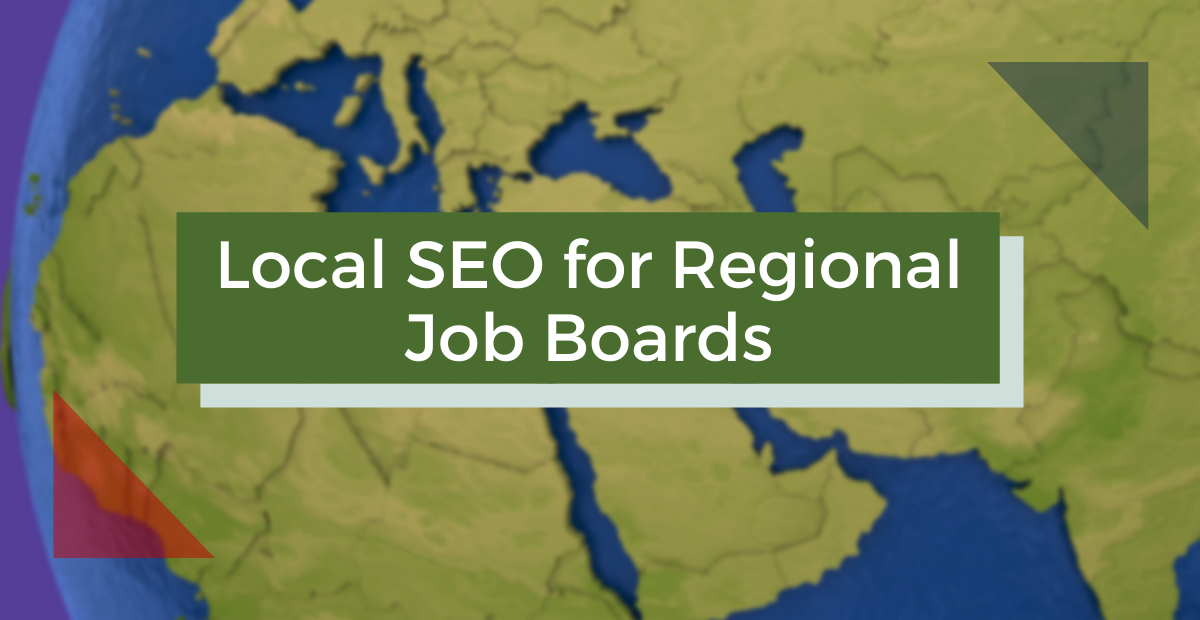Something many businesses that serve a particular geographic region take advantage of when it comes to their Search Engine Optimization is local SEO.
If you live in Moosejaw, Saskatchewan and search for “pizza”, it’s not very helpful if the results you get are for restaurants in New York. That’s why search engines try to deliver results that are relevant to your location as well as your search terms.
So, if you make great pizza in Moosejaw, how do you reach local potential customers? Okay, I know if you’re reading a blog on a job board software provider’s website, there’s a chance you run a job board or a recruiting business and are not in the business of making delicious pizza. (That said, if you’ve found a market for pizza-related employment and you’re thinking of starting a job board…call us!)
Below I’ve gathered some tips and resources for bolstering your local SEO and ideas on how to handle some of the challenges that online businesses may face.
What are the basics of local SEO?
The usual SEO advice still applies even if you’re focused locally. Your job board’s website should have good technical SEO, optimized and valuable content, and you should always be building up a positive reputation online through social media, being referenced by other relevant and trusted websites and online directories (backlinks). However, there are some other things you can do to help people in your target geography find your job board.
This guide from Shopify recommends registering your business and/or creating profiles on local directories and business listings, such as: Google Places (a.k.a. “My Business”), Yellow Pages, Foursquare, Yelp, Yahoo’s Local Listings, and BingPlaces. Hubspot also has an exhaustive list of 50 online local business directories to check out. You don’t have to create 50 profiles, the same way you don’t have to use every social media platform out there – figure out which ones are most relevant to you, your job board, and your target market and focus on those.
Do some research and see if there are other local business listings, especially if they’re focused on job search, recruiting, or on relevant industries. Look for local meet-up and social media groups related to your job board’s niche to see if they have any directories or membership lists you can join and add your job board. If you’re a new business, you may find there is a local community of start-ups you can join.
The most important thing for local SEO is consistency. Be consistent with how you list your business Name, Address, Phone number, and Website. Advice on local SEO refers to this as NAP+W, and by keeping this information consistent, search engines will be able to understand that all the places your job board business is referenced online are the same entity, which in turn helps it determine when your job board should turn up in search results. This includes having your location and/or physical address listed on your website – in your website’s footer or on your Contact page at the very least.
ThreeDeepMarketing also has a useful list of 6 of tips for local SEO that you should check out.
What if my job board business doesn’t have a physical address?
Moz has a great intro to local SEO that explains how businesses that don’t have a bricks-and-mortar location (like a retail store) are called “service-area businesses” (or SABs) and may be handled slightly differently.
If your job board business is run from your own home or an office that doesn’t want to invite walk-ins from random job seekers and recruiters, you may not want to publicly list it as your business’s location. So what are your options?
The Moz guide suggests that it’s best to consistently use the address you registered your business with, but that you can hide your address on your Google Business listing. That way, Google has verified your business’s location and will still show your business as being in that city or region, while not publicly displaying the address.
They also suggest customizing your hours of operation (are you open for business 9-to-5 or 24/7?), paying attention to the default geographic boundaries of your service area, and having a solid content strategy that includes locally-relevant information. For a job board, this might be showcasing local employers, career success stories from the area, and highlighting local resources for job seekers (including your job board!).
VendeSocial also has a nice outline for businesses without a physical address working on their local SEO, as does SearchEngineWatch.
What if my job board serves multiple locations?
Many new job boards start out targeting one city and then expand to another once they’re ready to grow.
Many online directories like Google My Business will let you add multiple locations to your listing, but again, consistency is important. If your first location is San Jose, California, and your second location is St John’s, Newfoundland, but your phone number for both uses a California area code, your St John’s location might have trouble or even violate Google’s listing rules.
SearchEngineLand has a top 5 list of challenges for multi-location SEO and ways to handle them.
How you apply this advice for your regional job board or recruiting platform may be highly individualized, depending on whether you have a business address, your willingness or ability to share it publicly, or whether your job board serves more than one location. Do your research, use common sense, and be consistent with the location-specific information you use.
Job boards focused on a particular geographic area – be it a town, municipal region, a big city, or province/state/territory/county – can take advantage of these tools and ideas to improve how they rank in local web searches and be found by relevant talent and customers.

